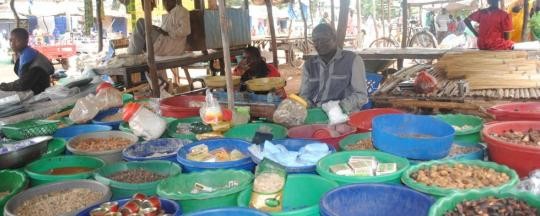This report is part of an exclusive series, ‘War Economy’, which focuses on the effects of civil war on the economic situation in South Sudan.
Consumer prices have risen significantly in Upper Nile State owing to the prevalence of roadside taxes and the declining value of the South Sudanese pound, according to local sources. In interviews this week, residents of the state capital Malakal complained about a rapid increase in prices.
One trader explained that the price of a battle of drinking water rose to 5 SSP, soda is 10 SSP and a jerrycan of oil is 400 SSP. A bag of sugar increased to 500 SSP, whereas a sack of onion costs 800 SSP, one of the traders explained. These prices are markedly higher than those in the capital Juba.
Ahmed Musa, a trader, attributed the increasing prices of commodities to the existence of multiple checkpoints for tax collection on the Malakal-Sudan road. He pointed out that they import goods from Sudan through smuggling via Joda checkpoint and Sennar.
Albino John, a local resident, said that the living conditions in Malakal are becoming unbearable due to the increasing prices at the market. The town mayor, Abdullah Jago, admitted that the citizens are suffering due to the increasing prices of consumer goods at the market.
He further said the recent fighting in Renk town stopped many traders from importing goods from Sudan through the established smuggling corridors. The local official explained that the commodities that come from the capital Juba are very expensive due to high cost of transportation.
Jago denied that illegal taxation is carried out at roadside checkpoints. “The local authorities are now collecting taxes by following legal ways so that it doesn’t affect the market,” he said. He attributed the soaring prices of commodities to high costs of transport and dependence on smuggling.
Farther east in the state, prices of some essential commodities have also shot up at the market in Bunj, capital of Maban County. Local traders told Radio Tamazuj that prices of sugar, onion, cooking oil and flour have dramatically increased.
They attributed the problem to the halt of transport between Renk and Maban and unfavourable exchange rate of dollar against the local currency. The traders further said wholesale traders refused to buy commodities due to heavy taxes imposed on them by the local authorities.
They urged the authorities to reduce the taxes levied on them.
Official statistics from Upper Nile State are lacking. South Sudan’s National Bureau of Statistics (NBS) is no longer collecting official statistics on commodities prices in Upper Nile. Upon release of the Consumer Price Index for February 2015, NBS stated, “It was not possible to collect data from Malakal in February 2014 due to insecurity.”
From data collected elsewhere in the country, the statistics bureau estimated that the consumer price index increased by 8.5% in February 2015 compared to February 2015. “The increase was mainly driven by high price in food and non-alcoholic beverages,” NBS reported.
Read more from the series ‘War Economy’:
S Sudan increases money supply (31 March)
South Sudan’s budget is twice last year’s oil earnings (30 March)
Irrecoverable losses at S Sudan oil fields (30 March)
Kiir’s office spends more than budget of an entire state (28 March)
Secrecy around South Sudan’s dwindling central bank reserves (28 March)
South Sudan’s Lakes police paid 2 months late (27 March)
Bread price rises in South Sudan state capital (27 March)
South Sudan fiscal report delayed after Q1 overspend (27 March)
South Sudan denies printing more money (27 March)




